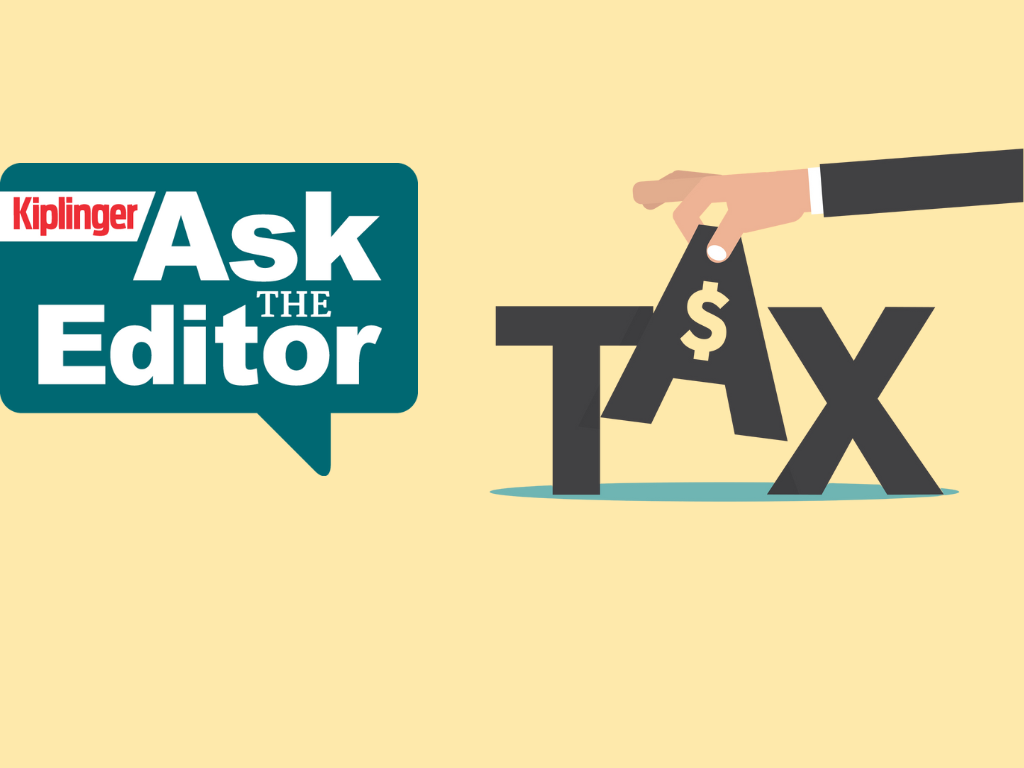Ask the Editor, July 17: Tax Questions on the New Tax Law
In our latest Ask the Editor round-up, Joy Taylor, The Kiplinger Tax Letter Editor, answers four questions on the "One Big Beautiful Bill Act"

Profit and prosper with the best of Kiplinger's advice on investing, taxes, retirement, personal finance and much more. Delivered daily. Enter your email in the box and click Sign Me Up.
You are now subscribed
Your newsletter sign-up was successful
Want to add more newsletters?

Delivered daily
Kiplinger Today
Profit and prosper with the best of Kiplinger's advice on investing, taxes, retirement, personal finance and much more delivered daily. Smart money moves start here.

Sent five days a week
Kiplinger A Step Ahead
Get practical help to make better financial decisions in your everyday life, from spending to savings on top deals.

Delivered daily
Kiplinger Closing Bell
Get today's biggest financial and investing headlines delivered to your inbox every day the U.S. stock market is open.

Sent twice a week
Kiplinger Adviser Intel
Financial pros across the country share best practices and fresh tactics to preserve and grow your wealth.

Delivered weekly
Kiplinger Tax Tips
Trim your federal and state tax bills with practical tax-planning and tax-cutting strategies.

Sent twice a week
Kiplinger Retirement Tips
Your twice-a-week guide to planning and enjoying a financially secure and richly rewarding retirement

Sent bimonthly.
Kiplinger Adviser Angle
Insights for advisers, wealth managers and other financial professionals.

Sent twice a week
Kiplinger Investing Weekly
Your twice-a-week roundup of promising stocks, funds, companies and industries you should consider, ones you should avoid, and why.

Sent weekly for six weeks
Kiplinger Invest for Retirement
Your step-by-step six-part series on how to invest for retirement, from devising a successful strategy to exactly which investments to choose.
Each week, in our Ask the Editor series, Joy Taylor, The Kiplinger Tax Letter Editor, answers questions on topics submitted by readers. This week, she’s looking at questions on the new tax law. (Get a free issue of The Kiplinger Tax Letter or subscribe.)
1. Effective Date of Tax Changes
Question: Are the tax provisions in the so-called “One Big Beautiful Bill Act” (OBBB) retroactive to Jan. 1, 2025, or do they start in 2026?
Joy Taylor: The new law permanently extends most of the tax provisions in the 2017 Tax Cuts and Jobs Act that were slated to expire on December 31 and enhances some of them, provides brand new tax breaks, repeals several clean-energy credits in the 2022 Inflation Reduction Act, and more. Many of the changes begin in 2025, and others take effect next year.
Here are several examples of tax changes that take effect beginning in 2025:
From just $107.88 $24.99 for Kiplinger Personal Finance
Become a smarter, better informed investor. Subscribe from just $107.88 $24.99, plus get up to 4 Special Issues

Sign up for Kiplinger’s Free Newsletters
Profit and prosper with the best of expert advice on investing, taxes, retirement, personal finance and more - straight to your e-mail.
Profit and prosper with the best of expert advice - straight to your e-mail.
- Higher standard deductions.
- The $6,000 bonus deduction for seniors.
- The bigger child tax credit.
- The $40,000 cap on deducting state and local taxes on Schedule A of the Form 1040.
- The new tax deductions for tip income, overtime pay and auto loan interest.
- 100% first-year bonus depreciation for business assets.
- And the higher “Section 179” expensing limit for business assets.
Here are some examples of tax changes that are scheduled to begin in 2026:
- The new $15 million lifetime estate and gift tax exemption.
- The higher child and dependent care credit.
- A new above-the-line deduction of up to $1,000 ($2,000 on joint returns) for charitable cash contributions.
- And a couple of haircuts for taxpayers who itemize deductions on Schedule A of the 1040.
2. Tax Credit for Solar Panels on Home
Question: I am thinking of installing solar panels on my primary home. Can I still get a federal income tax credit for this?
Joy Taylor: Yes, but the project must be completed by December 31 at the latest. The residential clean-energy credit equals 30% of the cost of materials and installation of alternative energy systems (such as solar panels) that you install in your home. The OBBB ends the tax break for post-2025 years.
Also repealed after this year is the smaller energy-efficient home improvement credit for homeowners who make smaller energy-saving purchases, such as for efficient central air-conditioning systems, water heaters, heat pumps, exterior doors, and windows. So if you’re thinking of making any of these energy-saving upgrades to your home, you’ll have to pay for the upgrades and complete them by December 31, 2025, to ensure a tax credit.
3. Interest on Auto Loans
Question: I bought a new car earlier this year, and I took out a loan to finance the purchase. Will I be able to deduct the interest that I pay this year on my 2025 tax return that I file next year?
Joy Taylor: It depends. The OBBB allows individuals who buy a new vehicle (car, minivan, SUV, van, pickup truck or motorcycle) for personal use after 2024 to deduct in each of 2025 through 2028 up to $10,000 of interest that they pay on their vehicle loans. This new car loan interest deduction is an above-the-line deduction, meaning it is available to taxpayers who take the standard deduction and to those who itemize on Schedule A of the 1040. The deduction begins to phase out at modified adjusted gross incomes over $200,000 for joint filers and $100,000 for other filers, and ends at modified AGIs over $250,000 for joint filers and $150,000 for others. Additionally, the vehicle’s final assembly must occur in the U.S.
4. Name Change
Question: I heard the newly passed tax law that President Trump signed on July 4 is no longer named the “One Big Beautiful Bill Act.” Why did the name change?
Joy Taylor: The short title of the new law was originally the “One Big Beautiful Bill Act.” However, shortly before the Senate voted on its version of the legislation, Senate Minority Leader Chuck Schumer (D-NY) argued that the title of the bill violated the technical budget reconciliation rules that Senate Republicans were using to pass the bill on a simple majority vote in the upper chamber. The short title was then struck from the bill prior to the Senate vote. The full title of the law is “An Act to Provide for Reconciliation Pursuant to Title II of H. Con. Res. 14.” Unfortunately, this doesn’t roll off the tongue quite as easily as the “One Big Beautiful Bill Act.” So you will see many people, including myself, continue to refer to the law as the “One Big Beautiful Bill.”
About Ask the Editor, Tax Edition
Subscribers of The Kiplinger Tax Letter and The Kiplinger Letter can ask Joy questions about tax topics. You'll find full details of how to submit questions in The Kiplinger Tax Letter and The Kiplinger Letter. (Subscribe to The Kiplinger Tax Letter or The Kiplinger Letter.)
We have already received many questions from readers on tax changes in the new “One Big Beautiful Bill Act.” We’ve addressed a few here, and we will answer more of these queries in a future Ask the Editor round-up. So keep those questions coming!
Not all questions submitted will be published, and some may be condensed and/or combined with other similar questions and answers, as required editorially. The answers provided by our editors and experts, in this Q&A series, are for general informational purposes only. While we take reasonable precautions to ensure we provide accurate answers to your questions, this information does not and is not intended to, constitute independent financial, legal, or tax advice. You should not act, or refrain from acting, based on any information provided in this feature. You should consult with a financial or tax advisor regarding any questions you may have in relation to the matters discussed in this article.
More Reader Questions Answered
- Ask the Editor: Questions on tax deductions and IRAs
- Ask the Editor: Questions on home sales and taxes
- Ask the Editor: Questions on Inherited IRAs
- Ask the Editor: Questions on Trump's Big Beautiful Bill (part 1)
- Ask the Editor: Questions on capital gains
Profit and prosper with the best of Kiplinger's advice on investing, taxes, retirement, personal finance and much more. Delivered daily. Enter your email in the box and click Sign Me Up.

Joy is an experienced CPA and tax attorney with an L.L.M. in Taxation from New York University School of Law. After many years working for big law and accounting firms, Joy saw the light and now puts her education, legal experience and in-depth knowledge of federal tax law to use writing for Kiplinger. She writes and edits The Kiplinger Tax Letter and contributes federal tax and retirement stories to kiplinger.com and Kiplinger’s Retirement Report. Her articles have been picked up by the Washington Post and other media outlets. Joy has also appeared as a tax expert in newspapers, on television and on radio discussing federal tax developments.
-
 Quiz: Do You Know How to Avoid the "Medigap Trap?"
Quiz: Do You Know How to Avoid the "Medigap Trap?"Quiz Test your basic knowledge of the "Medigap Trap" in our quick quiz.
-
 5 Top Tax-Efficient Mutual Funds for Smarter Investing
5 Top Tax-Efficient Mutual Funds for Smarter InvestingMutual funds are many things, but "tax-friendly" usually isn't one of them. These are the exceptions.
-
 AI Sparks Existential Crisis for Software Stocks
AI Sparks Existential Crisis for Software StocksThe Kiplinger Letter Fears that SaaS subscription software could be rendered obsolete by artificial intelligence make investors jittery.
-
 Ask the Editor, February 13: More Questions on IRAs
Ask the Editor, February 13: More Questions on IRAsAsk the Editor In this week's Ask the Editor Q&A, Joy Taylor answers questions on IRAs
-
 How to Open Your Kid's $1,000 Trump Account
How to Open Your Kid's $1,000 Trump AccountTax Breaks Filing income taxes in 2026? You won't want to miss Form 4547 to claim a $1,000 Trump Account for your child.
-
 7 Bad Tax Habits to Kick Right Now
7 Bad Tax Habits to Kick Right NowTax Tips Ditch these seven common habits to sidestep IRS red flags for a smoother, faster 2026 income tax filing.
-
 Ask the Editor, February 6: Questions on Federal Income Tax Deductions
Ask the Editor, February 6: Questions on Federal Income Tax DeductionsAsk the Editor In this week's Ask the Editor Q&A, Joy Taylor answers questions on federal income tax deductions
-
 Should You Do Your Own Taxes This Year or Hire a Pro?
Should You Do Your Own Taxes This Year or Hire a Pro?Taxes Doing your own taxes isn’t easy, and hiring a tax pro isn’t cheap. Here’s a guide to help you figure out whether to tackle the job on your own or hire a professional.
-
 Ask the Editor, January 30: Questions on Social Security Benefits Taxation
Ask the Editor, January 30: Questions on Social Security Benefits TaxationAsk the Editor In this week's Ask the Editor Q&A, Joy Taylor answers questions on the taxation of Social Security benefits
-
 Don't Overpay the IRS: 6 Tax Mistakes That Could Be Raising Your Bill
Don't Overpay the IRS: 6 Tax Mistakes That Could Be Raising Your BillTax Tips Is your income tax bill bigger than expected? Here's how you should prepare for next year.
-
 Will IRS Budget Cuts Disrupt Tax Season? What You Need to Know
Will IRS Budget Cuts Disrupt Tax Season? What You Need to KnowTaxes The 2026 tax season could be an unprecedented one for the IRS. Here’s how you can be proactive to keep up with the status of your return.